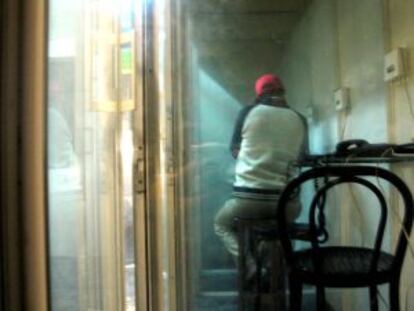Network of 250 Spanish butchers and phone shops funding jihadists in Syria
ISIS sympathizers using ‘hawala’ system to secretly transfer money to terrorists, say police


Spain has become a major financing hub for jihadist terrorists in Syria and Iraq through an extensive network of 250 phone call centers, butcher shops and neighborhood grocery stores, where money is transferred through an informal and virtually untraceable system, according to Spanish intelligence agencies.
This network, which uses the so-called hawala system – defined by Interpol as money transfer without money movement – manages the savings of over 150,000 Muslims without any legal oversight, and is also being used to help fund terror groups such as Islamic State (ISIS) and al-Nusra Front, an Al Qaeda affiliate.
The secret network used by hawaladars, or hawala dealers, is also a conduit to pay the salaries of Spanish jihadists for their work in brigades at camps in northern Syria. They receive about $800 if they are single and $1,200 if they are married, according to police sources.
Secrecy and immediacy are what make this money transfer system attractive
“Some are helping their families by sending them money. ISIS has also become a company that provides jobs and pays its workers,” said a top official at the National Police’s intelligence department, the Comisaría General de Información.
Hundreds of young residents in Spain – mostly Moroccans – have joined ISIS. At least 13 have died in suicide missions that caused dozens of deaths among Syrian President Bashar al-Assad’s military forces. Top intelligence security officers admit they have no exact numbers on how many have traveled to Syria to join other jihadists. “It is impossible to know,” said one supervisor.
The secret hawala network in Spain is comprised of about 300 hawaladars – the majority of them Pakistanis – who run clandestine offices in Barcelona, Tarragona, Lleida, Bilbao, Santander, Valencia, Madrid, Logroño, León, Jaén and Almería, and other cities with large Pakistani communities.
Oversight is “practically zero,” according to anti-terrorism officials. “We know that the system is helping the jihadists in Syria,” said one investigator.
“Our French brothers did well”
Mustafa Maya Amaya, 51, an important jihadist recruiter who was arrested last March in Melilla, celebrated from his jail cell last month's terrorist attacks in Paris, which left 17 people dead at satirical magazine Charlie Hebdo and a Jewish kosher supermarket.
During the two days that French police were searching for the three attackers – brothers Said and Chérif Kouachi and Amédy Coulibaly – Maya expressed his pleasure. “Very well done by our French brothers,” he said, according to prison and police sources.
Sitting in a wheelchair in front of a computer inside his Melilla home, the bearded Maya operated an extensive network that recruited volunteers from nine different countries to fight for Islamic State in Syria. He was arrested along with seven other people.
The Interior Ministry is keeping tabs on around 50 inmates who are suspected of jihadist sympathies.
In a secret US Embassy cable sent to Washington on October 4, 2004, officials said Spain was an important financing center for jihadists in Iraq and Afghanistan.
Transactions between hawala brokers are done without promissory notes because the system is heavily based on trust, and agents usually destroy documents that reflect the accounting. Among those using it in Spain are Syrians, Tunisians, Algerians and especially Pakistanis.
The hawala system was invented by the Chinese to transfer money that cannot be traced by the international banking systems. There is a hawala operation in almost every country, collecting and paying out money in exchange for a commission. Usually, a driver on a bicycle or scooter shows up the next day to deliver the cash. Secrecy and immediacy are what make this money transfer system attractive.
The hawala network in Spain has been used to finance terrorist operations in the past. Khalid Sheikh Mohammed, the alleged mastermind behind the 9/11 attacks, used various hawala agents in Logroño and Barcelona. Mohammad Afzaal and Shazad Ali Gujar, two Pakistanis who lived in Barcelona’s El Raval neighborhood, sent money through a hawala call center that went to a terrorism cell responsible for the death of Wall Street Journal reporter Daniel Pearl in 2002. The call center, which was owned by Mohammad Choudhry Aslam, reportedly transferred around €18 million in 15 months, according to a judicial inquiry.
Ahmed Rukhsar, a farmer from Punjab who ran a call center in Logroño, sent €9,500 to an account in Valencia that belonged to a Pakistani ceramist. The money was used to purchase a truck filled with explosives driven by suicide bomber Nizar Nouar, who killed 22 tourists in Tunisia in 2002.
“We hadn’t seen anything like this since the Afghan War. Not only do they recruit fighters here but they are also receiving money from here,” said one intelligence agent. “The network has grown. We believe there are around 250 hawala establishments in all of Spain.”
Tu suscripción se está usando en otro dispositivo
¿Quieres añadir otro usuario a tu suscripción?
Si continúas leyendo en este dispositivo, no se podrá leer en el otro.
FlechaTu suscripción se está usando en otro dispositivo y solo puedes acceder a EL PAÍS desde un dispositivo a la vez.
Si quieres compartir tu cuenta, cambia tu suscripción a la modalidad Premium, así podrás añadir otro usuario. Cada uno accederá con su propia cuenta de email, lo que os permitirá personalizar vuestra experiencia en EL PAÍS.
En el caso de no saber quién está usando tu cuenta, te recomendamos cambiar tu contraseña aquí.
Si decides continuar compartiendo tu cuenta, este mensaje se mostrará en tu dispositivo y en el de la otra persona que está usando tu cuenta de forma indefinida, afectando a tu experiencia de lectura. Puedes consultar aquí los términos y condiciones de la suscripción digital.







































